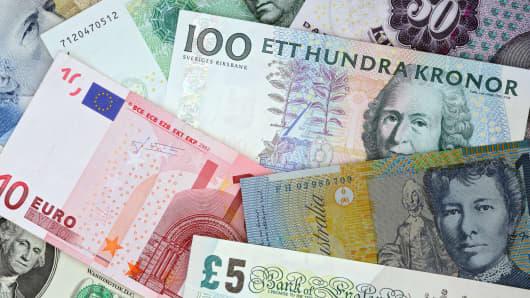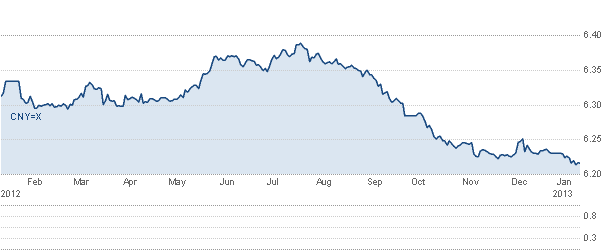As Beijing eases control over its currency and opens up its financial markets to foreign investors, the yuan is gaining ground as a global currency and is headed for further gains.
The yuan, also known as the renminbi, hit a record high of 6.2124 against the U.S. dollar this week and analysts said the currency is at its strongest level since China's government unified official and market exchange rates in 1993.
The significance here is not the trend in the yuan, which has been slowly edging up ever since China dropped its currency peg against the dollar in 2005, but the growing use of the yuan internationally, said China watchers.
"This is all about the function of the currency and not the value, which moves just a little bit," HSBC's global head of forex strategy David Bloom, said about the recent gains in the yuan on CNBC Asia's "Squawk Box" Friday.
"The yuan is at much more of an equilibrium value right now and this currency is all about opening up. We are talking about death and decay in other markets, but China's going its own way. This is about the liberalization of the currency and that's going to be fascinating over the next few years," he added.
Data released last week by SWIFT, a global transaction services organization, showed that international payments in China's yuan soared 24 percent in November from the month earlier and hit a record 0.56 percent of the global total.
While tight capital controls limit the use of the yuan outside of mainland China and Hong Kong, Beijing has been encouraging greater use of the currency globally via bilateral currency swaps and trade settlement deals.
Chinese central bank data last week show that cross-border trade settlement in the yuan stood at 2.94 trillion ($467 billion) last year, a rise of 41 percent from 2011.
(Read More: How the Yuan Could Take the Dollar's Crown)
Countries with close trade links with China have been leading a push to use the yuan in global transactions because it lowers costs and currency risks for companies. Australian businesses are increasingly settling their Chinese trade in yuan rather than U.S. dollars, according to an article in The Australian this week. China is Australia's biggest trading partner.




